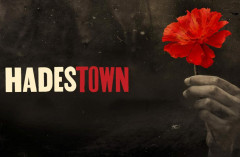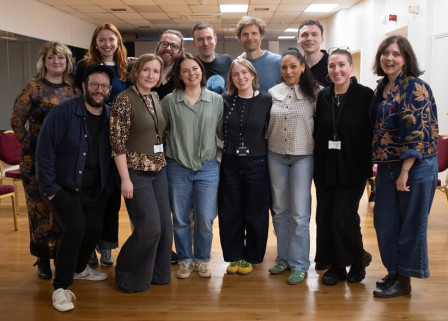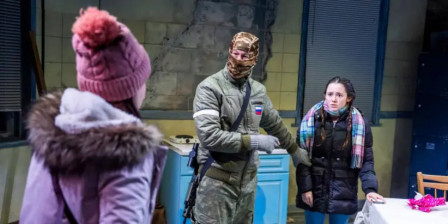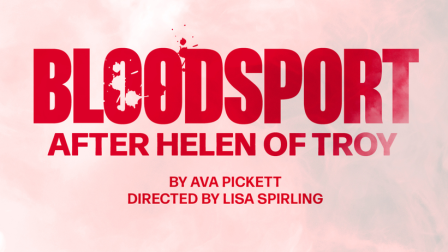Review: HADESTOWN at the National Theatre
 The folksy musical HADESTOWN arrives at the main stage of our National Theatre with a great deal of expectation appropriate to a piece which began as a low key acoustic set of songs which were picked up and developed by some very prestigious North American Theatres until it made a stir in NYC.
The folksy musical HADESTOWN arrives at the main stage of our National Theatre with a great deal of expectation appropriate to a piece which began as a low key acoustic set of songs which were picked up and developed by some very prestigious North American Theatres until it made a stir in NYC.
The opening was fabulous as the stately figure of André De Sheilds, a senior with a magnificent grey afro, the craggy face of god and a strut that’s pure 1970s Harlem flashed a smile and announced himself as Hermes, the narrator of our tale and messenger to the Gods. The chorus, sat on an open stage, around bar tables, in lumberjack chic, began to sing against an infectious New Orleans vamp and we were off.
It’s hard to pin-point exactly when my high spirits sank but it was quite early on when it became apparent that the entire evening was going to be interchangeable whiney indi-ballades, 1990s style, interspersed with more retro Cajun stomps. Actually that sounds fun. It isn’t it’s energy sappingly repetitive.
It would help if there were some drama or interesting characters on some kind of emotional journey. Instead the show employs the bare bones of the Ancient Greek Orpheus myth and adds nothing.
Orpheus (Reeve Carney) a weedy introspective folk singer, meets Eurydice (Eva Noblezada) a wilful angsty traveler. He announces he loves her, she immediately falls in with this but is transported to the underworld. So he announces he’ll go and bring her back and does. Almost. In the few times of peril he charms adversaries with a magic song, the chorus of which sounds disconcertingly like Shia’s pop song CHANDELIER.
The Fates are three close harmony singers in 1920s jazz garb, Persephone (Amber Grey) the god of summer is sassy (but will turn out, of course, to be big hearted) Hades (the imposing Patrick Page with a Tom Waits voice) is a stern and forbidding factory owner (but will learn, of course, to bend a little).
How do they stretch this wafer thin plot out for 2.5 hours? The answer is by repeating almost every plot point at least twice, as indie folk ballade, then Cajun swing then, often, as another whiney ballade. As an example of how repetitive the story telling gets is the Act Two opening number in which Persephone tells us her name is Persephone. Yeah, we know. You told us in several songs in Act One.
All the lyrics are platitudes. Yes, there may be a song that references building a wall but that’s simply not enough to make the piece feel immediate.
If you like the music of Anaïs Mitchell who wrote it all you’ll have a great time. I don’t dislike it and I love Cajun music, it’s just there's so much of it, with so little variety dramatic impetus or character insight.
The staging doesn’t help either, surprisingly so as it’s directed by Rachel Chavkin who made such a great job of NATASHA PIERRE AND THE GREAT COMET on and off Broadway. On this occasion way too much time is spent with the cast walking in circles around a rising and falling platform.
Full marks for musicality but on the whole this is a big disappointment and it’s surprising that the National have chosen a new piece that’s so musically retrospective to open at the Olivier Theatre.
Latest News

 Rehearsals begin for World Premiere of new musical 'FLYBY'
4 March 2026 at 06:51
Rehearsals begin for World Premiere of new musical 'FLYBY'
4 March 2026 at 06:51

 Review: UKRAINE UNBROKEN at Arcola Theatre
3 March 2026 at 16:18
Review: UKRAINE UNBROKEN at Arcola Theatre
3 March 2026 at 16:18

 New Cast Announced For MAGIC MIKE LIVE
3 March 2026 at 15:09
New Cast Announced For MAGIC MIKE LIVE
3 March 2026 at 15:09

 World premiere of 'BLOODSPORT: AFTER HELEN OF TROY' at Stratford East announced
3 March 2026 at 12:00
World premiere of 'BLOODSPORT: AFTER HELEN OF TROY' at Stratford East announced
3 March 2026 at 12:00
